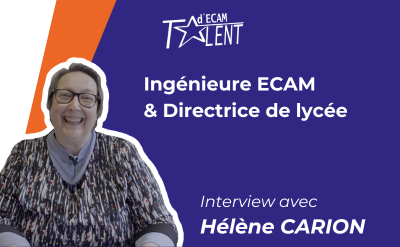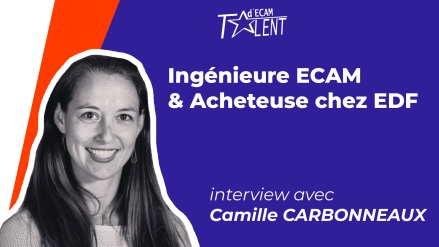News

In-Memoriam - Frère Jean-Marie MICHEL
This text is a collection of testimonials from former engineering students, comrades and colleagues of Mr. Jean-Marie MICHEL, a Brother of the Christian Schools, professor, researcher and eminent figure in the life of our school.
A professor who teaches an arduous subject (theoretical mechanics) for
forty years (1955-1997) and at the same time leads a research career
that will earn him international renown is not a common occurrence at ÉCAM.
That's why we pay tribute to him.
IN-MEMORIAM
Jean-Marie MICHEL
1932-2024
Marie-Thérèse MICHEL
Jean-Marie was born in 1932 in a small village in Lorraine where his parents ran a farm.
After attending boarding school in Nancy, he left Lorraine to pursue his studies in Besançon, Lille, Luxembourg and Paris. He joined the Brothers of the Christian Schools and became a professor at ÉCAM in 1955.
His scientific training made him an artilleryman during the Algerian war.
Still teaching, but still studying: he prepared a thesis in Grenoble and joined the CNRS as a researcher, while continuing to teach in Lyon.
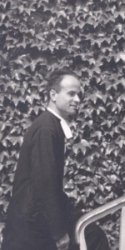
He left the religious life when it no longer coincided with his
why he'd chosen her.
Passing on his knowledge, guiding his students, leading research projects, directing a team of researchers: he deeply enjoyed this rich professional life, in which his human and intellectual qualities were deployed to the full.
We were married in 1973, and Marie and Étienne are our two children.
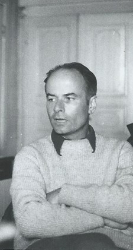
Although training future engineers, he preferred mountain running, skiing, hiking, reading, meeting new people and committing himself to the service of Christ and the Church.
For several years, the disease reduced his physical faculties, but without affecting his sense of humor, his smile, his modesty or his inner strength.
Jean-Pierre FRANC, LEGI, CNRS
Jean-Marie MICHEL has had a rich scientific career, which I would like to retrace as a former work colleague.
He was a research director at the CNRS and made his career in a research laboratory on the Saint-Martin d'Hères university campus, LEGI, Laboratoire des Écoulements Géophysiques et Industriels.
It was in the 60s, while teaching at ÉCAM, that he decided to pursue a career in scientific research.
He then moved closer to the Grenoble Institute of Mechanics, which was a very attractive research center, with in particular Louis NÉEL, winner of the Nobel Prize in Physics in 1970, who was president of his state thesis jury.
It was thus that Jean-Marie MICHEL turned to fluid mechanics, which was to remain his favourite field throughout his long scientific career, and more specifically to a phenomenon that was little-known at the time and which scientists called "cavitation".
Under the impetus of Professors Antoine CRAYA and Jacques DODU, who became his thesis supervisor, he was entrusted with a particularly ambitious scientific project that would take him ten years to develop: the construction of a large-scale test facility, a hydrodynamic tunnel.
These points bear witness to this:
- His research team, the "Cavitation" team, was strengthened by the arrival of a number of young doctoral students, whom he successfully guided to the completion of their theses;
- He was invited to give lectures and courses on cavitation in many countries (Brazil, Morocco, China, etc.) in addition to the courses he gave in Grenoble and Lyon;
- He publishes his work in a wide range of journals, particularly in English, which ensures that his research results are widely disseminated;
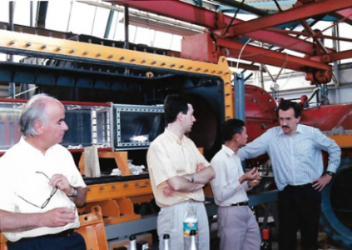
- He developed international collaborations, particularly with several Japanese colleagues, and set up regular scientific exchanges between France and Japan with Professor KATO of Tokyo University over several years;
- In 1998, he organized an International Symposium on Cavitation in Grenoble, bringing together some 200 scientists from all over the world, including some of the world's most renowned researchers;
- In 1995, he co-authored a French-language book on cavitation, and in 2005 published an English-language book on the same subject, which has become a worldwide reference and was translated into Chinese a few years later, testifying to the considerable international impact of his research work.
Beyond his great professional qualities, Jean-Marie MICHEL was a man of integrity with whom it was particularly pleasant to work. He was very respectful of others, always careful not to upset, offend or cast a shadow.
He has had a rich scientific career. Remarkably, he has acquired international renown over the years without ever having asked for it.
He was no careerist. He used to say:
"I tried to preserve myself from this flaw [he was talking about careerism] by avoiding, for example, at aperitifs following VIP receptions, consorting ostentatiously with high-ranking people from my laboratory whose personal ambition I felt needed to be seen in order to exist. Instead, I would form a group with the humblest people, secretaries, technicians and workers, whose conversation was more interesting, varied and cheerful."
Bernard PINATEL, ÉCAM 71, Director of Studies (1989-1994) and Director (1995-2009)
I've had the privilege of meeting Jean-Marie MICHEL in very different situations.
First of all, when I was a student, Jean-Marie taught us mechanics, including fluid mechanics. He would be at ÉCAM for up to two and a half days, then return to Grenoble for his research activities the rest of the week. He would arrive at 40 montée st Barthélémy on Sunday evening and sleep in the foyer to be ready for work on Monday morning. So we sometimes had the opportunity to spend Sunday evening with him. The discussions were always very interesting.
As a teacher, he had a knack for explaining simple things and complex demonstrations in the same way, always in the same mood. This was often confusing for us students.
From 1989 onwards, as Director of Studies, I had to arrange his class timetable: his discretion and regularity were a delight for me as an organizer of studies.
In 1994, as Director of ÉCAM, I had the pleasure of welcoming Jean-Marie.
In 1997, as he was leaving ÉCAM, I ventured a few lines:
...All your students have, one day, been captivated
With the disconcerting ease you demonstrate
To be explained in an identical context
Simple exercises and complex problems.
You've got the scholar's forehead and calm,
As a teacher, you have patience, a real weapon,
As far as passengers are concerned, you have the Grenoble-Lyon record,
From the mechanic, you have the elasticity and adaptability...
I remember him as a convinced humanist, a great scientist and a man of great kindness and courtesy.
Michel DENIS, ÉCAM 69, Director of Studies (1994-2001)
All those who had him as a teacher appreciated his qualities of rigor, clarity and great scientific culture, which he applied to teaching all the fundamentals of mechanics: statics, kinematics, dynamics and continuous media.
His love of the mountains was well known:
a problem on shocks was inspired by his experience of a fall in the mountains.
He showed us that the parameters of his fall (height, elasticity of the rope, intensity of his rope-mate's braking and inclination of the rock where the fall ended) were close to ideal conditions for escaping unscathed! And so it proved.
He was passionate about pedagogy, happy to awaken the intellect, demanding (a demand he applied to himself in the preparation of his teaching) and lavish with explanations and clarifications whenever he was asked.
One vivid memory dates back to May 1968, when the student world was in turmoil and classes at ÉCAM were suspended.
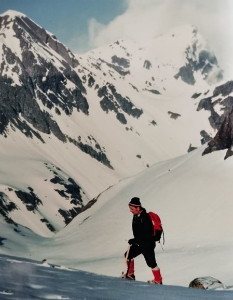
A few students, however, stayed on. They organized meetings to review the events. I remember Jean-Marie MICHEL attending and giving his analysis of the excessive distance between leaders and citizens. His remarks were very pertinent, and his hindsight contrasted with the hasty and unrestrained speeches relayed by the media. For me as a student, the brilliant professor had taken on the role of educator.
Another memory is in a completely different context. In the winter of 1980, the students invited the ÉCAM teachers to a ski outing. Jean-Marie was present. We skied in an excellent atmosphere. A slalom ended the weekend. On Saturday evening, we shared a fondue in a joyful and relaxed atmosphere, in a convivial spirit which he greatly appreciated for its closeness to the students.
Pierre-Marie GUERITEY, ÉCAM 68, Director of Studies (2001-2007) and Michèle GUERITEY
Today, teachers at ÉCAM are professors-researchers, PhDs and, in some cases, qualified to direct research (HDR). In the early 1960s, the school was still recovering from its departure from Erquelinnes in 1940, and its move to the Lazaristes boarding school in Lyon in 1946. Its directors were still the Christian Brothers who had made the move, attached to an "Arts et Métiers" model of large workshops, a few laboratories and professors devoted exclusively to teaching, with no research activity.
When Brother Vincent, Director of Studies, passed away in 1969, some would have liked Jean-Marie Michel to give up what he had started and take on more responsibility within the School...
He persisted in his chosen path, but for more than forty years he continued to take on a full-time teaching load at ÉCAM, teaching high quality and difficult subjects, while at the same time maintaining his research career and family life in Grenoble. He only gradually ceased his activity at the school when the 3 or 4 people needed to take over his teaching duties could be recruited; he left teaching at ÉCAM altogether in 1997.
We attended the funeral of Jean-Marie MICHEL: the Voreppe church was packed with his family. During the simple and moving religious ceremony, several people bore witness to his scientific and human qualities and his involvement in parish life, before the burial under the February sun at the top of the Bourg cemetery.
Christian BROUAT, ÉCAM 70
In September 1966, when I entered the school as a 1st year student, I was lucky enough to have Jean-Marie MICHEL as my teacher.
The clarity, rigor and power of his mind, and his qualities as a man, made him a teacher who left none of his students and colleagues indifferent.
Beyond all these references and in all simplicity, he was able to build friendly relationships with his students and encourage exchanges that helped them to grow in their learning of life as a Man.
Today's ÉCAM undoubtedly bears the imprint of his commitment to her.
For several years, our two families spent their summer vacations together in the Alps. The days were busy with family walks, sightseeing and high-mountain excursions. How reassuring it was to have Jean-Marie as a rope companion!
Stricken by an illness that weakened him daily, he faced his ordeal with a courage that won our admiration.
Jean-Paul FAYOLLE, ÉCAM 70
I was in second year at the Lazaristes when I had my first contact with Jean-Marie Michel; a contact through physics, as he posed the physics problem for the end-of-year exam.
We were doubly impressed; firstly because he was a professor at ÉCAM, a mirage for us, and secondly when we received the papers and discovered that they were marked out of 40!
At the time, I couldn't imagine what would happen to our relationship.
Five years later I became one of his students.
It was a time of post-conciliar ferment. I was a member of the high school liturgical group: Jean-Marie was seduced by what was going on and joined.
There he met my sister, who became his wife.
Faced with his departure, the question arises: what have we lost?
Who was it at Jean-Marie Michel's house that leaves us bitter at not having access to it anymore?
I think he was one of those people who, through who they are and what they do, help people to live and grow.
At one time or another, in one way or another, he has enlightened our lives.
Martin POCHON, sj, ÉCAM 72
What vivid memories I still have of this friendship. What can I say? What I keep is, how can I put it, his way of being in the world and with others. A fine, luminous attentiveness.
I first had him as a teacher, and what was striking was that he didn't use his status as a teacher-researcher to assert personal authority. I think he would present the beautiful equations that explain phenomena as simply as possible. He tried to share with us his admiration for nature that allowed itself to be modeled, and for the human intelligence that was capable of grasping it. What finesse and simplicity of expression. I seem to recall the words of his jury president at his thesis defense, Nobel Prize winner in physics Louis NÉEL: "A fine theorist, coupled with a meticulous experimenter!
His Grenoble apartment was decorated with beautiful swirls of cavitational bubbles taken from his laboratory.
We ended up hiking together. He lived it with the same spirit: intelligence and admiration.
It was in the Oisans and Mont Blanc mountains that I met his future wife, and I was very moved to witness their wedding.
I think he approached people with the same spirit: finesse, attention, admiration, intelligence, a need for rationality but also affection, often with a touch of humor in the face of some interlocutors' slightly offbeat remarks.

 27
27







